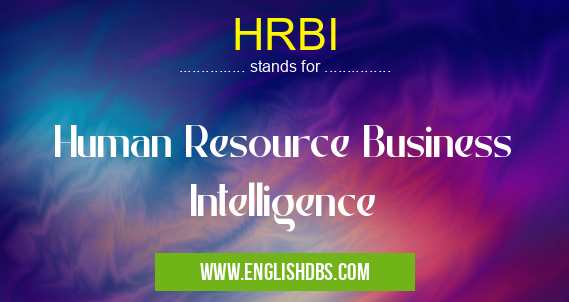What does HRBI mean in BUSINESS
HRBI (Human Resource Business Intelligence) is a data-driven approach to HR management that leverages technology to improve decision-making and strategic planning within organizations. By analyzing and interpreting HR data, organizations can gain valuable insights into workforce trends, employee performance, and the effectiveness of HR programs.

HRBI meaning in Business in Business
HRBI mostly used in an acronym Business in Category Business that means Human Resource Business Intelligence
Shorthand: HRBI,
Full Form: Human Resource Business Intelligence
For more information of "Human Resource Business Intelligence", see the section below.
Understanding HRBI
HRBI involves the collection, analysis, and visualization of HR data. This data can come from various sources, including HR systems, employee surveys, and performance management systems. HRBI professionals use advanced analytics tools and techniques to extract meaningful information from this data.
Benefits of HRBI
Improved Decision-Making: HRBI provides managers with data-driven insights that support informed decision-making. It helps identify areas for improvement, optimize resource allocation, and align HR strategies with business objectives.
Enhanced Employee Experience: HRBI can improve the employee experience by identifying trends in employee engagement, satisfaction, and turnover. By understanding these factors, organizations can develop targeted interventions to address employee concerns and foster a positive work environment.
Increased Workforce Productivity: HRBI helps organizations optimize workforce productivity by identifying skills gaps, training needs, and performance issues. By leveraging data insights, companies can implement targeted training programs to enhance employee capabilities and increase efficiency.
Essential Questions and Answers on Human Resource Business Intelligence in "BUSINESS»BUSINESS"
What is HRBI (Human Resource Business Intelligence)?
HRBI is a data-driven approach that combines human resource (HR) data with business metrics to provide insights and inform organizational decision-making. It enables HR professionals to make data-backed decisions, improve HR processes, and align HR strategies with business objectives.
What are the benefits of using HRBI?
HRBI offers numerous benefits, including:
- Improved data-driven decision-making
- Enhanced talent management and recruitment
- Increased employee engagement and retention
- Optimized HR processes and resource allocation
- Reduced costs and improved efficiency
How does HRBI work?
HRBI leverages data from multiple sources, such as HR systems, performance evaluations, employee surveys, and business metrics. It involves:
- Data collection and integration
- Data analysis and interpretation
- Visualization and reporting of insights
- Actionable recommendations based on data
What are some examples of HRBI use cases?
HRBI can be applied in various areas of HR, including:
- Identifying high-performing employees
- Forecasting future talent needs
- Improving employee onboarding and development
- Optimizing compensation and benefits
- Enhancing HR service delivery
What are the challenges of implementing HRBI?
Implementing HRBI may present challenges, such as:
- Data quality and availability
- Technological limitations
- Skill gaps in data analysis
- Resistance to change within the organization
- Integration with existing HR systems
What are the best practices for implementing HRBI?
Best practices for implementing HRBI include:
- Defining clear objectives
- Establishing a strong data foundation
- Investing in data analysis and visualization tools
- Fostering collaboration between HR and business leaders
- Communicating insights effectively
Final Words: HRBI is an indispensable tool for modern HR departments. By harnessing the power of data, organizations can gain a deeper understanding of their workforce and make evidence-based decisions that drive business success. As technology continues to advance, HRBI is expected to play an increasingly vital role in shaping the future of HR management.
